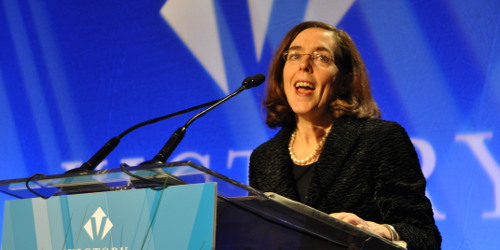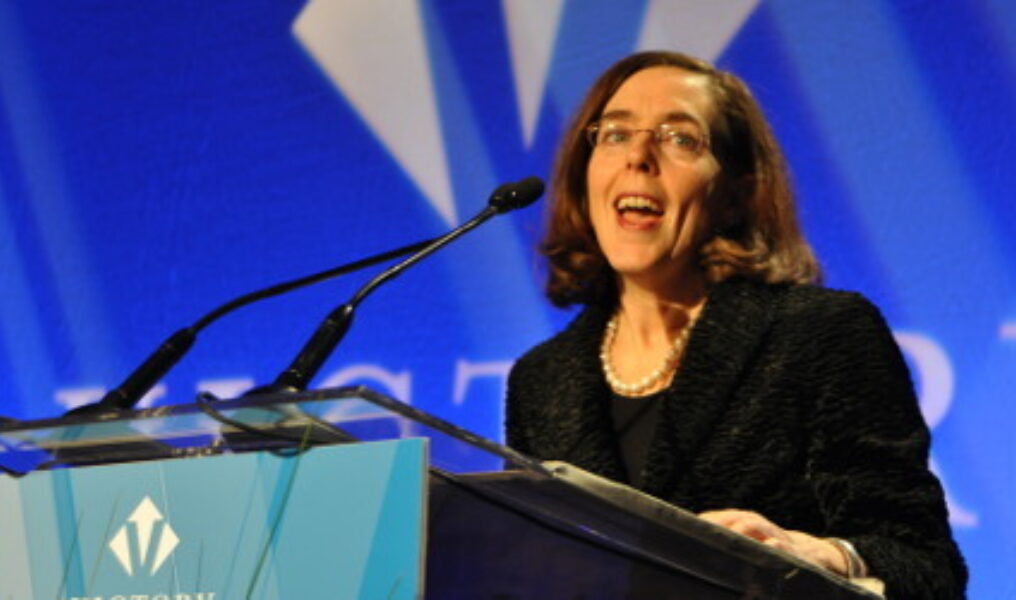By Lisa Keen

Kate Brown became the first openly LGBT person to be elected governor, winning the office in Oregon Nov. 8. File Photo: Michael Key, Washington Blade.
Kate Brown became the first openly LGBT person to be elected governor, winning the office in Oregon Nov. 8. Elsewhere in the nation, there were only a few scattered "firsts" to be celebrated, and 61 percent of 188 openly LGBT candidates this year won their races.
By comparison, in 2012, out of 152 LGBT candidates on the ballot, 77 percent (118) won, while 22 percent (33) lost.
In addition to Brown, the winners included Leslie Herod, the first openly LGBT African-American elected to the Colorado House; Carlos Guillermo Smith, the first openly LGBT Latino to be elected to the Florida state Legislature, representing Orlando; and Sam Park, the first openly gay man to be elected to the Georgia Legislature.
All six incumbent LGBT members of Congress won re-election Nov. 8, but other candidates for federal office had tough fights: None of the 12 newcomers seeking seats in Congress won. Two sought U.S. Senate seats, and 10 sought House seats. Businesswoman Angie Craig was expected to beat a Trump-like radio talk show host for Minnesota's 2nd Congressional district, but fell short 45 percent to Jason Lewis' 47 percent. Eight percent of the vote went to an independent candidate.
Candidates for State House and Senate seats fared much better: 74 percent of the 89 candidates won. Among the winners was newcomers Daniel Hernandez, the aide who helped save the life of then U.S. Rep. Gabby Giffords during a 2011 shooting incident in Tucson, Arizona. Hernandez won a seat to the Arizona State House. Toni Atkins, who was term limited out of her position as Speaker of the California Assembly, won a seat in the State Senate. Among the incumbents to win re-election was Minnesota State Rep. Karen Clark. Clark was elected in 1980 and has now been re-elected 18 times, representing the south Minneapolis area.
In local office elections, 33 out of 60 LGBT candidates won. Among them was newcomer Jimmy Flannigan who unseated an incumbent for a seat on the City Council in Austin, Texas.
And half of 16 LGBT candidates for elective judicial seats won election Tuesday. Kim Ogg beat out an incumbent to become Houston's new district attorney. And, in Washington State, lesbian Mary Yu won re-election to her seat on the Washington Supreme Court.
But the biggest victory by far for the LGBT community on Nov. 8 was that of Kate Brown, in her first run for governor of Oregon. Brown won with 51 percent of the vote. Her Republican challenger took 44 percent, and three other candidates took the remaining five percent.
"Kate Brown's win in Oregon is one for the history books," said Aisha C. Moodie-Mills, president of the Gay & Lesbian Victory Fund.
Brown, a bisexual married for almost 20 years to her husband Dan Little, is the first openly LGBT person to be elected as governor anywhere in the country. (The first LGBT person to serve as governor was Jim McGreevey, who came out as gay after being elected governor of New Jersey and then resigned office.)
Brown has been elected a state representative, a state senator, and then twice as Oregon's Secretary of State but stepped into the governor's position in 2015, after then Gov. John Kitzhaber resigned following an ethics scandal.
Brown, 56, embraces the opportunities she has to help the LGBT community. She told the Washington Post Nov. 9, "I will, within my role at the National Governors' Association and other organizations like the Western Governors Association, continue to use that voice and my experiences as a member of the LGBT community, as well as my female voice, to help us push forward as a nation."
The 188 LGBT candidates spanned 36 states plus the District of Columbia. California had the greatest number of LGBT candidates by far, with 50; followed by Washington State with 10, and Georgia with nine. Michigan had six LGBT candidates, and all won. Three won re-election or election to the State House: Jon Hoadley, Jeremy Moss, and newcomer Tim Sneller. Three others won local offices: Brian McGrain in Ingham County, Jason Morgan in Washtenaw County, and Richard Renner in Pioneer.
One candidate this year came out during his re-election campaign: North Carolina State Rep. Cecil Brockman of Greensboro publicly acknowledged being bisexual in an interview with his local paper Nov. 3. Brockman, 32, was running unopposed for his seat in the General Assembly.
Brockman told the News & Record, "I always felt that I tried to stick up for the LGBT community, even when I wasn't 'out.' I want to do more of my part, to be stronger and admit to the world that I'm actually a member of this community as well."










